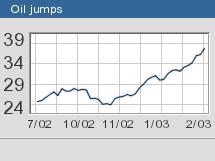NEW YORK (CNN/Money) - Investors would be wise to worry over the steady gains in oil.
The price of light sweet crude has nearly doubled from where it was at the beginning of 2002, and just since this year began it's risen 20 percent. Such price spikes raise a big red flag. In the past 30 years there has never been a significant move higher in energy prices that has not been followed by recession.
| Oil and the economy
|

|
|
|
|
The first big oil shock (and the worst) was the result of the 1973 oil embargo by the Organization of Petroleum Exporting Countries. From 1973 to 1974 oil nearly tripled in price. The economy slipped into its longest recession since World War II. Supply disruptions due to the Iranian Revolution led to a spike that brought crude from $15.85 a barrel in April 1979 to $39.50 a year later. In January of 1980, the U.S. economy fell into recession.
| Oil and you
|

|
|
|
|
After Saddam Hussein invaded Kuwait in 1990, oil more than doubled, briefly hitting $41.15 in October. Again, recession. And then there was that jump in 2000, when oil went from $25.50 a barrel at the beginning of the year to a high of $36 in November. In March 2001, a recession began.
The link between energy costs and the economy are direct. When prices go up, businesses and consumers put more of their money into keeping the lights on and keeping their gas tank filled. That leaves them with less to spend, stifling growth. Most economists think that the economy will be able to stave off recession, but they view the recent jump in crude costs with alarm.
"Oil shocks are a tax on growth, and this is no exception," said Richard Berner, chief U.S. economist at Morgan Stanley. "None of us know how long this supply shock is going to last."
You must believe in Spring

Berner believes the shock won't last too long. Winter does not last forever and thankfully (for many, blissfully) warmer weather is around the corner. Eventually strike-crippled Venezuelan supply will resume. And then, of course, there are the worries over Iraq -- worries that a war can be protracted, worries that Saddam Hussein will light his oil fields ablaze -- that have steadily worked their way into energy prices. Berner believes that once actual war comes, much of that "war premium" would fade. By late summer he sees oil back to $25 a barrel.
Even so, the higher prices will do considerable damage to the economy, thinks Berner, but won't be enough to sink it. Berner recently lowered his growth forecast for the United States in part because of higher energy costs.
But some market participants don't think oil will come down nearly as much as Berner does, and they expect it to go up even more before it comes on down.
"We're going to keep on marching higher here," said Fimat USA oil analyst John Kilduff. "The next stop is the $41.15 it hit on the heels of Saddam Hussein's invasion of Kuwait and from there I would expect another spike higher. Once hostilities ensue I wouldn't be surprised to see $50 or $60 print."
Prices remain on the high side even in the wake of war, thinks Tom Petrie, head of the energy investment bank and research firm Petrie Parkman.
"It's not going to sort out like the Gulf War, when prices broke in the first 24 hours of the air campaign," he said. "The world economy is a lot bigger in terms of its oil consumption now, and the resource base is a lot more mature."
More immediately, crude inventories in the United States are far lower than they were during the Gulf War. Even with the best outcomes -- warm weather, Venezuelan oil back on line, a quick war in Iraq -- it will take time to rebuild those inventories, and until they're rebuilt traders won't sleep easily.
Everything happens to me
But does what happens to the price of oil, now that it's spiked, even matter? After all, in the 1990 and 2000 experiences it jumped higher and jumped right back down -- but recession still came.
Economists think it does, saying that the last two recessions were not caused by the rise in oil prices so much as they were coincident with it. Or, looking it at a little differently, that energy prices were just one of many reasons the economy went into decline.
There are also issues of perception. Going into the Gulf War, for instance, worries ran high that the United States was in for a long war and that energy prices were going to be high for a good long time. Now the general sense is that war will be quick, and that shortly prices will come back down.
"Businesses' and consumers' view of why prices are up and how long they'll be up matters," said Goldman Sachs director of U.S. economic research Bill Dudley. "Let's say you're considering buying an SUV. If you think the rise is only temporary you're going to go ahead with your purchase."
So maybe this time is different. Wall Street is littered with the broken portfolios of investors who uttered that phrase.

|

